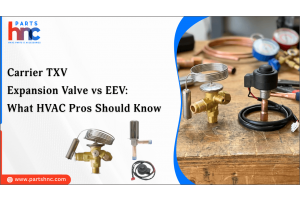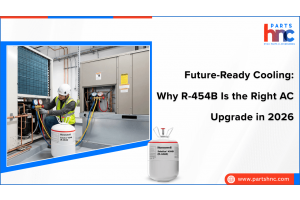How to Properly Prepare for Your HVAC Service Appointment
Preparing for your HVAC service appointment is key to ensuring that your system is running efficiently and that the technician can quickly address any issues. Whether it's a routine maintenance check, a repair, or an installation, taking a few simple steps beforehand can help the technician perform their work with ease and minimize any disruptions to your daily routine. By clearing the way for easy access, gathering necessary information, and being proactive about potential issues, you'll ensure a smoother, more effective service. In this article, we’ll walk you through how to prepare for your HVAC appointment to guarantee a seamless experience and keep your system performing at its best.
The Importance of Timely HVAC Service Maintenance
HVAC systems need immediate service maintenance to operate effectively throughout the entire year. The systematic check of equipment prevents simple problems from turning into extensive repairs that bring high costs. Scheduled checks during maintenance provide technicians early access to detect all problems before major expenses and system failures occur. Small system problems detected early enable improved system operations which results in better overall performance.
Benefits of Timely HVAC Service Maintenance:
-
Prevents Costly Repairs: Early detection of minimal issues helps avoid the need for costly breakdowns as well as substantial equipment repairs in upcoming years.
-
Enhances System Performance: Auspectation programs help operate HVAC systems efficiently which leads to better comfort conditions.
-
Improves Energy Efficiency: Your system operates more efficiently when filters ducts and components remain clean because this allows reduced energy usage and lower utility expenses.
-
Extends HVAC Lifespan: Regular service operations minimize equipment deterioration that pushes up system durability and minimizes the requirement for premature replacements.
-
Improves Indoor Air Quality: Clean ventilation filters together with regularly cleaned ducts create better indoor air conditions which lowers the number of home allergens and pollutants inside your house.
How to Check Your Thermostat Before the Technician Arrives
Make sure your thermostat works correctly before scheduling your HVAC technician to arrive for maintenance. A faulty thermostat causes both incorrect temperature measurements and poor HVAC system operation. You can verify your thermostat operation through this quick procedure.
-
Test Temperature Settings: The thermostat should be set to heating and cooling modes while users adjust temperatures in both settings to verify proper system activation. To heat your space set the thermostat above room temperature while cooling requires a temperature setting below the current room temperature. The system needs to function properly according to its programming.
-
Check for Display or Power Issues: Verify that your thermostat display correctly shows all relevant data along with its power functionality being active. A blank screen on the display might signal either dead batteries or a blown fuse as potential power problems. Check your battery-operated thermostat by replacing the current batteries.
-
Calibrate the Thermostat: You should consider thermostat calibration since older units or inconsistent meter readings require this adjustment. Manual recalibration is possible with certain models but other systems need professional assistance for this task.
-
Check for Error Messages: Modern thermostats show error codes through their display to indicate system problems. Write down any detected error message so the technician can identify the issue more effectively.
Your pre-check of the thermostat will help the technician perform their work more efficiently and accurately.
How to Ensure Efficient HVAC Repairs and Maintenance with Early Preparation
The key to efficient HVAC repair and maintenance depends heavily on performing early preparations. A few proactive measures enable technicians to identify problems quickly which streamlines their service process.
-
Schedule Regular Inspections: The first step in early preparation requires scheduling routine inspections for HVAC systems. System inspections meet two goals which help prevent expensive maintenance by letting technicians correct minor issues during early stages.
-
Clear the Work Area: Make sure the HVAC unit installation area remains clean with no obstacles present. The simplicity of the system repair process increases when technicians can quickly access your system because of proper access. The area clearance protects your belongings from damage while it simultaneously protects the technician from potential hazards.
-
Document Existing Issues: Record all observed issues that include strange noises and inadequate airflow and temperature irregularities. A list of identified problems presented to the technician enables them to find the fundamental source of system breakdowns with greater speed.
-
Change Air Filters Regularly: Regular replacement or cleaning of air filters should happen before scheduling a service appointment. The performance of your system suffers when filters become clogged while additional problems may develop from this condition. The replacement of filters delivers two benefits to system performance while speeding up maintenance processes.
For more tips on efficient HVAC repairs and maintenance, check out this article on how to clean Goodman evaporator coil quickly and easily.
How to Maintain Your HVAC System Between Professional Service Appointments
The maintenance of your HVAC system between scheduling for professional service allows you to preserve its lifespan and functional excellence. Preventative tasks for your system will both enhance performance and avoid unpredictable system failures.
-
Replace or Clean Air Filters: Regular replacement or cleaning of air filters stands as the simplest method to maintain your HVAC system. The efficiency of your HVAC system decreases along with its strain because air filters become filled with dirt which blocks airflow. Regular filter replacement should occur every 1–3 months but you need to do it more frequently if you have pets or allergies.
-
Keep Vents and Ducts Clean: Regular cleaning of vents and air ducts must be performed to maintain their free state from dust and debris and obstructions. Your HVAC system becomes less efficient while creating cooling or heating unevenness when vents become blocked. You should vacuum the area around vents to maintain their clear state.
-
Check the Thermostat: The accuracy of your thermostat settings should be checked periodically. Test the system by changing the temperature settings to verify proper operation. A malfunctioning thermostat creates temperature problems while wasting more energy.
-
Clear the Outdoor Unit: The outdoor unit of air conditioners should remain clear from leaves and dirt and other debris. A unit that remains clean enables better airflow and stops the system from overheating. Keep a minimum of two feet of space clear around the unit by trimming plants and shrubs near the unit.
Simple maintenance routines will enhance your HVAC system life expectancy as well as boost its energy performance and minimize risky service requirements.
What You Need to Know About HVAC Filters and Replacements
HVAC filters serve an essential purpose for sustaining heating and cooling systems performance together with indoor air purity levels. The filter system acts as an obstruction to stop dust and dirt along with allergens and particles from moving into your home. The lifespan of your HVAC system depends on proper filter maintenance and replacement knowledge which also ensures a healthy indoor environment.
-
Why Filters Matter: The evidence shows HVAC filters serve as vital protection for HVAC system components because they stop dirt buildup that harms efficiency and causes lasting damage. The filters work as trapping agents for dangerous pollutants as well as dust particles which protect your health's safety.
-
How Often to Replace Filters: The replacement schedule for HVAC filters depends on multiple elements such as the filter type and the number of household members and pet presence and allergy conditions. The lifespan of filters ranges between 1 to 3 months. The signs that your filter needs replacement sooner include weak air circulation and increasing electricity costs and excessive dust buildup.
-
Choosing the Right Filter: The selection of appropriate filters includes fiberglass and pleated and HEPA filters among others. The MERV rating system establishes the effectiveness standards for filters. The MERV rating determines filter efficiency yet you must select a filter that matches your HVAC system to prevent airflow blockage.
For more insights into optimizing HVAC performance and improving indoor air quality, check out this guide on maintaining HVAC systems with HEPA filters in HVAC systems
How to Choose the Right HVAC Service Provider for Your Needs
Your HVAC system requires a qualified service provider to achieve both top-quality maintenance and professional attention. A dependable technician provides efficient system repairs while showing you how to maintain your system to increase its operational time. The selection of an appropriate HVAC service provider requires evaluation of these essential factors:
-
Check Credentials and Certifications: Verify that the company uses technicians who possess valid licenses and professional certifications. Verify that technicians possess certifications from NATE (North American Technician Excellence) or the ACCA (Air Conditioning Contractors of America). The certifications verify that technicians possess all necessary skills and knowledge.
-
Read Reviews and Ask for Recommendations: Customer reviews provide valuable information about the quality of service which a provider delivers. Check for reviews which address their dependability as well as their professionalism and satisfaction of customers. Your search for a trustworthy provider can benefit from recommendations obtained from friends, family members and neighbors.
-
Experience and Specialization: Select an HVAC service provider who possesses deep experience in HVAC work and specializes in your system's brand and type. A technician with experience will solve and fix issues with efficiency.
-
Get Multiple Quotes: Obtain multiple price quotes from different companies to evaluate their service packages and rates. You should select a provider who offers reasonable rates that match their service quality even though low-cost options may not always deliver the best results.
-
Offer Emergency Services: Emergency services should be available from HVAC providers because heating and cooling problems often emerge without warning. A service provider must support emergency services and adjustable scheduling capabilities to handle immediate needs especially when peak times occur.
Your selection of an HVAC service provider becomes easier when you evaluate these factors because it helps you find a provider that matches your requirements and maintains system efficiency throughout multiple years.
Your HVAC system will perform efficiently and sustain longer periods with proper preparation together with regular maintenance practices applied. Active behavior in checking and servicing your HVAC system and maintaining proper filter condition helps you prevent equipment failures which would lead to expensive repairs. The understanding of HVAC maintenance systems enables homeowners to develop healthy environments within their homes while decreasing their utility expenses. Your system will receive optimal performance when you select a qualified service provider who provides expert care.
Small tasks such as cleaning the work area and replacing filters together with system performance tracking will produce substantial benefits. Proactive services add value to your HVAC system lifetime and boost operational efficiency which leads to cost savings in future. Your HVAC system will operate at its peak while offering comfort to your family for every season by performing these straightforward preventive measures.
Keep your HVAC system in peak condition with PartsHnC maintenance services! We carry premium HVAC parts from leading brands like Carrier, Rheem, and Honeywell, including filters, motors, and capacitors. Ensure your system's efficiency and longevity with high-quality replacements. Visit PartsHnC now for top-tier HVAC parts and professional care!
FAQs
How often does HVAC need to be serviced?
Heating and Air Conditioning equipment, no matter what kind you have, should be inspected, cleaned, and serviced at least once a year. The best scenario is to have the heating system checked in the Fall and the air conditioning checked in the Spring.
What is a chiller in HVAC?
An HVAC chiller is a machine that removes heat from a liquid and circulates it through a building to cool the air. Chillers are a key part of many large-scale air conditioning systems.
What is a good substitute for coil cleaner?
If you like the idea of water-based coil cleaning but it's not getting the coils as clean as you like, try adding a bit of dish detergent to the mix. This mild cleaning agent is readily available and ensures you aren't introducing harsh chemicals into your home environment.
What is standard HVAC maintenance?
Replace air filters every 90 days. Keep the area around the HVAC system clear so that nothing prevents air from coming in or going out. Once a month, inspect the AC refrigerant lines for leaks. In the summer, turn off water to the furnace humidifier.
 Loyalty Program
Loyalty Program














